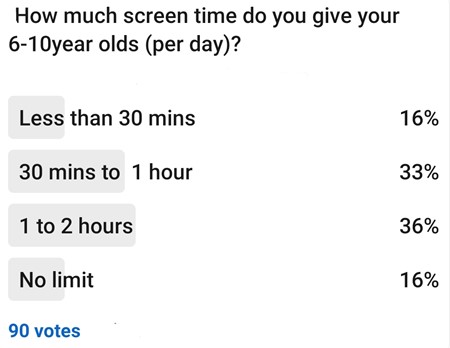Kids today are spending less time outside and are constantly inundated by screens. Technology is a huge part of their everyday life, from the classroom to their homes. Ofcom estimates that 5-7 years olds are spending over 4 hours per day in front of their television screens, tablets, and computers. Even more so during the pandemic & homeschooling. How do you control screen time? Is it good or bad? How much screen time is too much?
Don’t worry, you’re not alone. Most parents are trying to figure out what screen time limits for their kids should look like.
How screen time should my kids have?
Our survey of over 90 parents found that most parents were comfortable with between 30 mins to 2 hours of screen time, for 6-10year olds. For 2-5year olds, the American Association of Paediatrics recommends no more than 1 hour per day. Importantly though, we also discovered that there are different types of screen time:
 Active screen time – This could include anything from school learning, instructional videos about drawing or building things, interactive video, talking-to or actively playing games with other children.
Active screen time – This could include anything from school learning, instructional videos about drawing or building things, interactive video, talking-to or actively playing games with other children.
Passive screen time – Activities such as watching classic TV shows on Netflix or YouTube, where the child has no input or immediate activity.
Sara DeWitt put it nicely in her Ted talk, where she explains how screen are an intrinsic part of our children’s lives. Engaging actively with our children about what they’re doing is a great way to build your relationship with your children, and better understand them.
As such, it might be better to think more about balancing screen time, rather than just limiting it. Here’s some idea to help create some screen time balance:
- Have a family goal – Sit down as a family and talk about your plan for how the family will handle screen time, and consider the types of screen time (or reasons for use). Including your children in the discussion is important. By including them, you are allowing them to voice their opinions and you are showing them that you respect those opinions. They will be more likely to stick to your family plan, and they will take responsibility for their screen usage.
- Encourage interests outside of the screens – Help your child explore and develop other interests they might have. Enroll them on a sports team or a music class. It is important that they make time for other activities that they enjoy. As a parent, you can model this too. If you also engage in activities that you enjoy outside of using screens, this will help to communicate the importance of enjoying other activities.
- Monitor their online activity and engage with them – Keep a close eye on what your child is doing online (Google Family Link is a great android app, and Microsoft Family Accounts are great for Windows devices). Look for signs that your child might be feeling overwhelmed by social media, or other online activities. When you notice that they are feeling stressed, or that they seem unusually consumed with their devices, spend time talking with them. Engaging with them about their screen time usage will help to encourage them to not get too consumed with their device.
- Set specific time for “family time” – Adults have busy lives, just like kids! It’s important to set aside specific time in the week that is designated as “family time.” During this time, all screens could be turned off and the focus can be on bonding as a family.
- Encourage appropriate screen time usage – It is important that you spend time teaching your child appropriate behavior regarding screen time. You can rely on apps to monitor the amount of time your child spends on their screens, and you can block inappropriate content, but it is important that your child learns what is appropriate and what is not. As your child gets older, they are more and more likely to encounter content that is inappropriate. By setting clear expectations and talking to them about what is and what is not appropriate, your child will be equipped to use their screens independently.
Signs that your kid has had too much screen time

There are instances when there’s just too much time spent on digital devices, and the effects can be visible on your child.
- It is the first thing they reach for in the morning – If your child immediately wakes up and grabs their device, they could probably benefit from a break. This isn’t too different from the 60% of adults who check their email before getting out of bed. We all need to set boundaries.
- They have lost interest in activities they once enjoyed – Maybe your child used to play with their toy cars, dolls or a sport, but now hardly ever picks up anything other than their device? This would be an indicator that a limit on screen time is needed.
- Screen time causes a lot of friction in the household – When you tell your child screen time is over and they get really upset and refuse to put away their device they have had too much screen time.
- They are overstimulated – Overstimulation varies from child to child. Some children will become easily upset and throw a tantrum or cry while others will shut down and show hardly any emotions. Either way, this is a sign that they need some down time.
Side effects of too much screen time for kids
When children spend too much time using their devices there are many side effects that occur:
- Decreased language skills – Young children who are given screens at an early age tend to have decreased language skills. Often young children are given a phone, or a tablet, to keep them still and quiet. Young children develop language & learning skills by interacting with their family, friends, and reading. However, with increased screen usage, many of those interactions are not happening as often.
- Increased vision problems – Staring at a screen all day is very hard on their eyes. Young children who are using screens regularly have a higher chance of needing glasses.
- Lower quality of sleep – The recommendation is that children do not use any screens 2 hours before their bedtime. Using a screen close to bedtime will make it very hard for them to shut their brains down and relax.
- Weight gain – Most children spend more time on their screens than they do outside playing. Due to this, weight gain is a sign that your child has been using their screens too much.
Are there benefits to allowing your kid screen time?
Yes, of course, there can be benefits to screen time. Not every activity has to be analogue. Screens are an intrinsic part of the world our children live in. The key is to allow screen time in moderation. When enjoyed in moderation, children experience increased:
- Social connections – Through the internet children can connect with their peers in a way that is less intimidating. They can connect with children that have similar interests, or become closer to family/friends that live further away.
- Knowledge – If provided educational websites and apps, children can expand on their learning in a fun and engaging way. There are loads of great programming applications and games for them to explore.
- Creativity – Technology provides plenty of ways for children to explore their creativity. There’s so many great sites that are great for drawing, crafts or even dancing!
Encouraging responsible screen time usage in your child is incredibly important. While children can benefit from using their devices, it is important that it is done in moderation. Once they start to lose interest in activities that used to bring them joy, and they start exhibiting other negative side effects, it is time to limit their usage. In addition to limiting their usage, as a parent, you must teach them appropriate behaviors. The expectations should be clear and consistent. Successfully managing your child’s screen usage will help to ensure that they healthy, safe and learn self-control.


